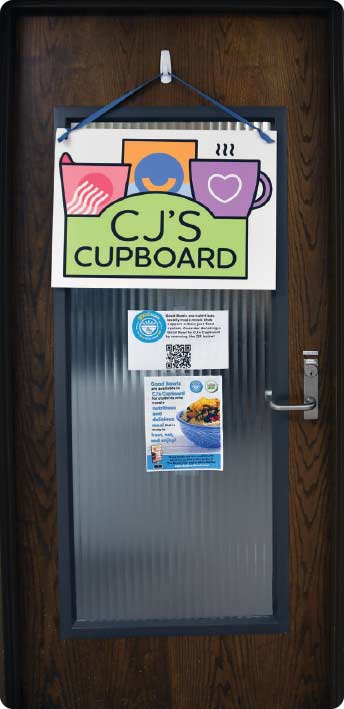CJ’s Cupboard is located at 2210 McGavran-Greenberg Hall and is always seeking donations of nutrient-dense and non-perishable items.
The Gillings School's commitment to well-being starts internally. We cannot lead multi-dimensional public health approaches if we don’t first put them into practice ourselves.
Health has many facets beyond the physical — it’s also emotional, social, financial, academic and environmental.

As a school of public health, our commitment to well-being starts internally. We cannot demonstrate leadership in this multi-dimensional public health approach if we don’t first put it into practice on our own campus.
“We want to make sure that everyone, every student, is developing in all areas,” said Charletta Sims Evans, MEd, associate dean for student affairs. “Supporting mental health and well-being is a part of that. You can’t function in a classroom if you’re not taking care of yourself.”
For years, the Gillings School has explored new ways to promote campus well-being. Sims Evans, who is chair of the Mental Health and Well-being Task Force, has led the effort to support the student body. The task force seeks to reduce student stressors by broadening access to funding and support resources, providing safe avenues to share concerns and address mental health, and creating opportunities to connect with peers and explore academic flexibility.
These strategies are based on student feedback, along with advice from leadership groups like the Minority Student Caucus and the Student Government Association.
Based on task force recommendations, a faculty mentoring committee has also been established to provide faculty with mentorship training, and the student affairs office has hired a second career services coordinator to help students prepare for life after graduation. They will soon be adding a Gillings-dedicated counselor from UNC’s Counseling and Psychological Services (CAPS), as well.
Gillings leadership also provides many well-being resources through its Culture of Health initiative, which was inspired by the Robert Wood Johnson Foundation and uses the Centers for Disease Control and Prevention’s Worksite Health ScoreCard to identify areas that can effectively foster wellness. The Culture of Health was initially established under the leadership of Dean Emerita Barbara K. Rimer, DrPH, MPH, and led by Penny Slade-Sawyer, a longstanding public health leader and former senior consultant for the North Carolina Institute for Public Health. It is currently co-chaired by Rhoda Cerny and [Melissa Walter, MPH, RDN, LDN](https://sph.unc.edu/nutr/mphrd-faculty-and-staff/#:~:text=MPH%2C RDN%2C LDN-,Melissa Walter%2C MPH%2C RDN%2C LDN,-Program Specialist%2C PRISM), who collaborate with staff in academics, facilities and wellness providers around campus to offer weekly yoga classes, mindful relaxation sessions, walking groups, healthy snacks, nutrition and self-care infographics, training on mental health and environmental safety, and more. These events are open to all students, faculty and staff.

Penny Slade-Sawyer and the Culture of Health team host a “Love Your Heart” event in the Armfield Atrium.
“There are so many things involved in creating a Culture of Health,” Cerny says. “There are people working on practical safety and health strategies. But two of my favorite things to do are to provide opportunities for students and employees to relax and practice self-care in the middle of their busy days and to create fun events for people to get together and enjoy each other’s company.”
The Culture of Health website shares resources and suggestions that can be incorporated into daily routines, including podcast and webinar recommendations, nutrition suggestions, personal activities, and collaborative events. But it can be hard for people to find time to take a break from work and prioritize well-being. Cerny says that this is where the culture in Culture of Health is critical. Leadership is a critical component in modeling that culture.
“We’ve had students from our Total Worker Health® graduate program give us ideas on how to encourage that culture among leadership,” she said. “One suggestion is to ensure that all managers and supervisors attend trainings so that they can be resources for employee well-being, but it’s important for someone in leadership to advocate for that.”
Most recently, School leadership created a resource to address food insecurity after a survey found that nearly 10% of Gillings students did not have consistent access to food. Associate Professor Amanda Holliday, MS, RD, LDN, and the Nutrition Coalition worked with student and University groups to establish CJ’s Cupboard, a food pantry located in 2210 McGavran-Greenberg Hall that serves the entire Gillings community.
CJ’s Cupboard carries non-perishable foods, utensils, sanitary items, oral care, diapers and other personal necessities. Most popular among them, according to Holliday, are foods that meet cultural or dietary needs and items that are in small, easy-to-carry packages. They also partner with Good Bowls to provide nutritious frozen meals.
“Our goal is to normalize this,” she said. “We all forget our lunch or have months where the money runs out. I encourage anyone to go to CJ’s if they need to. The door is always unlocked.”
Since its inception, the Cupboard has seen visits from handfuls of students every day, and because it relies on donations, it can be hard to keep food in stock. Donations can be dropped off at any time, and donors are encouraged to purchase items from the cupboard’s online wish list.
“We are a flagship school of public health,” Holliday said. “We should do the very basics for our own. And that includes food.”
The School and University collaborate on other avenues of support, as well, including work/life and wellness programs for employees and the Heels Care Network, which is a hub of mental health and well-being resources. Peers for Progress, housed in the Department of Health Behavior, also works with Sims Evans to provide peer support groups to the Gillings community.
We know that promoting health is a continuously evolving process that is informed by the unique needs of our community. Students in need of support can reach out to CAPS, and the UNC Employee Assistance Program can provide valuable personal and professional resources for faculty and staff.




.jpg)
